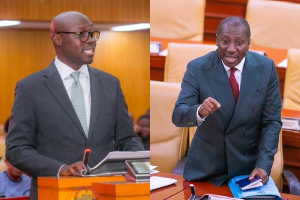Accra, July 28, GNA - The government should reduce the rate of the Value Added Tax (VAT) and widen its coverage especially to the informal sector. It should also get more companies within the threshold, which calls for what he called "the re-balancing of the fiscal policy to achieve budgetary goals," Mr Kwadwo Baah-Wiredu, Minister of Finance and Economic Planning, said on Wednesday. He was speaking at a lecture on International and Domestic VAT organised by the German Technical Co-operation (GTZ) and the Ghana Law School in Accra.
The topic was "Recent Developments and Trends in International and Domestic Value Added Tax" and it was aimed at promoting understanding of both the economic and legal aspects of VAT as a key factor in modern taxation. The lecture, which brought together local and international experts, also provided a platform for constructive and fruitful dialogue between taxpayers, consultants, tax administrators and politicians. It formed part of the efforts by GTZ and its partners, under its Good Governance Programme to develop comprehensive and customer-oriented taxpayer information for the avoidance of double taxation.
Mr Baah-Wiredu noted that since a significant portion of Government expenditure was from the donor community, there was the need to improve the national tax revenue generation by widening the tax net and improving control and service delivery. Government, he said, was committed to the development of an effective and efficient tax system with the ability to raise sufficient revenue for development.
"There is the need to look at ways of increasing the contribution of VAT, if government is to maintain it budget, not to mention the role that such increases in domestic revenue mobilisation plays in reducing reliance on foreign donors", he stated. The Minister said the challenges facing the development of VAT in the country, included problems of registration and collection of tax from the informal sector; low tax compliance and evasion, difficulties relating to cross-border transaction such as valuation of imports and export documentation.
Other difficulties he said were the application of the rules of origin; stabilisation of the newly established Large Taxpayer unit and tax management within the Free Zone Enclaves. He encouraged the VAT Service to find a solution to the difficulties to conform to internationally recognised and accepted standards of openness; accountability, fairness and good customer care.
Business News of Thursday, 28 July 2005
Source: GNA
















